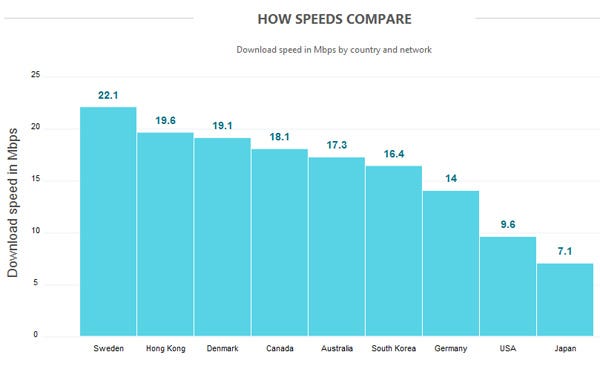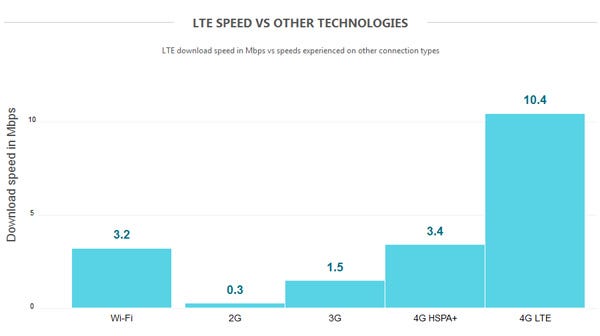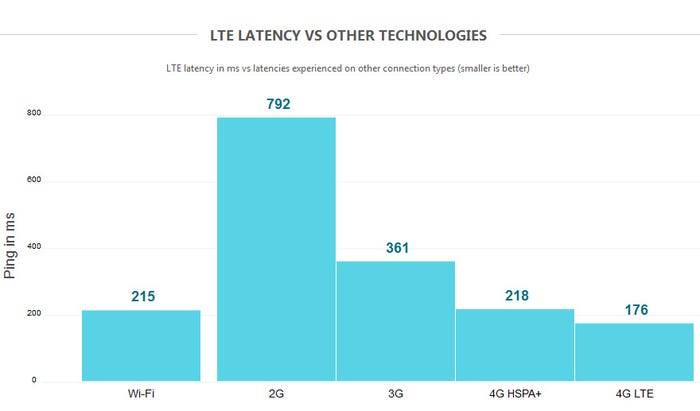Real world LTE test puts Japan in slow lane
With over 60 countries having launched commercial LTE networks, it’s no surprise that data speeds are not globally uniform. What might come as a surprise though is the claim that Japan, with one of the most advanced mobile markets in the world, has the slowest LTE experience at 7.1Mbps download. While Sweden, home of the first commercial LTE network, has maintained a crown with the fastest experience at 22.1Mbps on average.
February 14, 2013

With over 60 countries having launched commercial LTE networks, it’s no surprise that data speeds are not globally uniform. What might come as a surprise though is the claim that Japan, with one of the most advanced mobile markets in the world, has the slowest LTE experience at 7.1Mbps download. While Sweden, home of the first commercial LTE network, has maintained a crown with the fastest experience at 22.1Mbps on average.
The data comes from OpenSignal, a crowd-sourced coverage mapping startup funded by Qualcomm Ventures, O’Reilly AlphaTech Ventures & Passion Capital. With three million users worldwide, the company uses an Android app to track signal strength and coverage of mobile networks in Europe and the US.

To give some idea of the difference between the Swedish and Japanese experiences, OpenSignal found that 10.4 Mbps is the average LTE download speed globally. But the company said that it is important to remember that the actual speeds experienced by users on LTE can be markedly different, not simply between countries but also across carriers. It’s interesting to note that the countries where the fastest average speeds were recorded tend to be ones where the population is heavily concentrated in a small number of urban centres. Countries with a population that is more evenly spread seem to perform slightly worse, perhaps due to the difficulty of rolling-out LTE over a larger geographic area, OpenSignal said.
The LTE World Summit, the premier 4G event for the telecoms industry, is taking place on the 24th-26thJune 2013, at the Amsterdam RAI, Netherlands.Click here to download a flyer for the event.
The company’s application measures how the network is experienced and is considerably affected by device variance. Still it does claim to show how the LTE networks actually perform for the people that use them.
“This goes some way towards explaining why Metro PCS registers such slow LTE speeds, its users are generally on lower spec devices. That being said, we still record MetroPCS as being the slowest LTE network on high end devices as well, this is likely explained by the fact that Metro PCS is using a 5MHz channel while most US carriers are using 20MHz channels that have the ability to deliver much higher speeds,” the report found.

It’s true that a good number of carriers worldwide are investing in HSPA+ in order to sweat their existing assets before upgrading to LTE, but OpenSignal’s observations raise some interesting comparisons between LTE and wifi, which is now acknowledged as a cellular offload technology.
The full report is available here
Even though LTE is not ‘true 4G’ according to the standards bodies, OpenSignal still records it at around seven times faster on average than 3G, but it’s also considerably faster than wifi. However, when comparing the speed of LTE to wifi it is important to remember that the 3.2Mbps figure is a global average and therefore contains within it a vast spread of infrastructures and technologies.
That’s not to say that LTE is definitely faster than wifi, the firm said, adding: “This does point towards exciting possibilities for countries that are bypassing fixed-line internet service provision. Countries like India, which consumes primarily cellular data, will be able to use LTE technology to provide broadband speeds without the enormous infrastructure costs associated with laying cable to the home.”

About the Author
You May Also Like





.png?width=300&auto=webp&quality=80&disable=upscale)




.png?width=300&auto=webp&quality=80&disable=upscale)


_1.jpg?width=300&auto=webp&quality=80&disable=upscale)